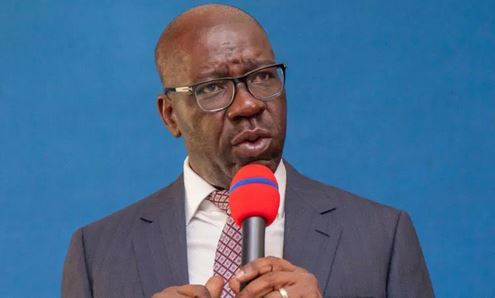Election: 30 Notable Things You Need To Know About Edo
Posted by Samuel on Fri 18th Sep, 2020 - tori.ngEdo governor, Godwin Obaseki
As Edo State gets ready to elect a new governor this weekend, PREMIUM TIMES highlights 30 notable things you need to know about the state located in the oil-rich South-south region of Nigeria, the 6th most populated nation in the world.
1. Edo State was part of the defunct Bendel State until 1991.
2. Edo State came into existence after Delta State was created out of the then Bendel State on August 27, 1991.
3. Its capital, Benin City, was also the capital of the defunct Mid-Western Region, which was excised from the defunct Western Region in 1963, renamed Midwestern State in 1967 and further renamed Bendel State in 1976.
4. Bendel was derived from the old Benin and Delta provinces.
5. The name of the Government House in Benin is Dennis Osadebay House.
6. Mr Osadebay was the first and only premier of the defunct Midwest Region hence the Government House was named after him. Mr Osadebay hailed from Asaba, the present capital of Delta State.
7. Edo State is one of the six states in the South-south geo-political zone.
8. Edo has a total population of 4,235,595 according to the 2006 census.
9. Edo State has 18 Local Government Areas and 193 wards.
10. Edo State has a total land area of 17,802 km2 (6,873 sq. ml).
11. Edo State is bounded in the south by Delta State, in the west by Ondo State and in the north and east by Kogi State.
12. Edo has an estimated voter population of 2,210,534 but only 1,726, 738 people collected PVCs to vote in Saturday’s governorship election.
13. Edo has 2,627 Polling Units.
14. Edo State uses the slogan “Heartbeat of the Nation.”
15. About 17 languages are spoken in Edo State. The major ones are Bini, Ishan, Afemai and Ora.
16. Edo State, like other states in the country, has three senatorial districts, namely Edo South, Edo Central and Edo North. While PDP won the South and Central districts in the 2019 general elections, the APC won in the Northern district.
17. The Edo South has 7 LGAs, Central 5 LGAs and North 6 LGAs.
18. Edo South also comprises mainly the Bini ethnic group. There are however some Ijaw, Itsekiri, Urhobo, Yoruba and Igbo (Igbanke) communities in this senatorial district.
19. Edo Central comprises the Ishan (originally called Esan) ethnic group.
20. Edo North has the Afemai (Etsako), Owan (Ora) and Akoko ethnic groups. There are some Igbira communities here too.
21. Edo has nine federal constituencies.
22. Upon the return of democracy in Nigeria in 1999, Edo State was governed by Lucky Igbinedion of the PDP. He was governor for two terms between 1999 and 2007.
23. Mr Igbinedion was succeeded by Oserheimen Osunbor, a former senator and professor of Law in May 2007 also on PDP ticket. He is an Ishan from Edo Central.
24. Mr Osunbor was sacked by the Court in November 2008 and was succeeded by Adams Oshiomhole, an Afemai from Edo North on the ticket of the defunct Action Congress (AC), which later became ACN, and subsequently joined other opposition parties to form APC.
25. Mr Oshiomhole was succeeded in 2016 by the incumbent, Godwin Obaseki, a Bini, from Edo South. He won on the platform of the ruling APC.
26. Edo State had been previously governed in the Third Republic by John Odigie-Oyegun, a retired permanent secretary (January 1992 to November 1993). Mr Odigie-Oyegun, a Bini, later became the national chairman of the APC.
27. The two democratically-elected governors who previously ruled Edo State when it was part of the defunct Bendel State were late Ambrose Alli, a professor of Morbid Anatomy (Second Republic between October 1979 and December 1983) and late Samuel Ogbemudia, a retired brigadier general (Second Republic between October and December 1983). While Mr Alli was an Ishan from Ekpoma (though his mother was Yoruba from Ido-Ani in Ondo State), Mr Ogbemudia, also a former military governor of the defunct Midwestern State, was a Bini.
28. Edo State was ruled previously by five military governors (and administrators) between 1991 and 1999.
29. There are five major higher institutions in Edo State, namely the University of Benin, Ambrose Alli University, Ekpoma, Edo University, Iyamho, Federal Polytechnic, Auchi and Edo Polytechnic, Usen.
30. Edo State has produced some notable people, including Augustus Aikhomu former vice president under Ibrahim Babangida military administration and Mike Akhigbe, Chief of General Staff under Abdulsalami Abubakar military regime.
There is also Anthony Enahoro, a politician who first moved a motion in Western House of Assembly for Nigeria’s independence in 1953; Michael Imoudu, a former labour leader; Benson Idahosa, frontline Pentecostal who founded the Church of God Mission; Chris Oyakhilome of Christ Embassy, Raymond Dokpesi, proprietor of AIT; John Momoh, proprietor of Channels TV; Dele Giwa, founding Editor-in-Chief of Newswatch magazine; Festus Iyayi, a former ASUU president and notable novelist, Sonny Okosun, a musician; Victor Uwaifo, a veteran musician.
Other prominent indigenes of the state are Anthony Anenih, a frontline politician; Abel Guobadia, former INEC chairman; Augustine Eguavoen, former Super Eagles coach; Odia Ofeimun, a novelist, numerous ministers and ambassadors.
***
Source: PREMIUM TIMES

















































